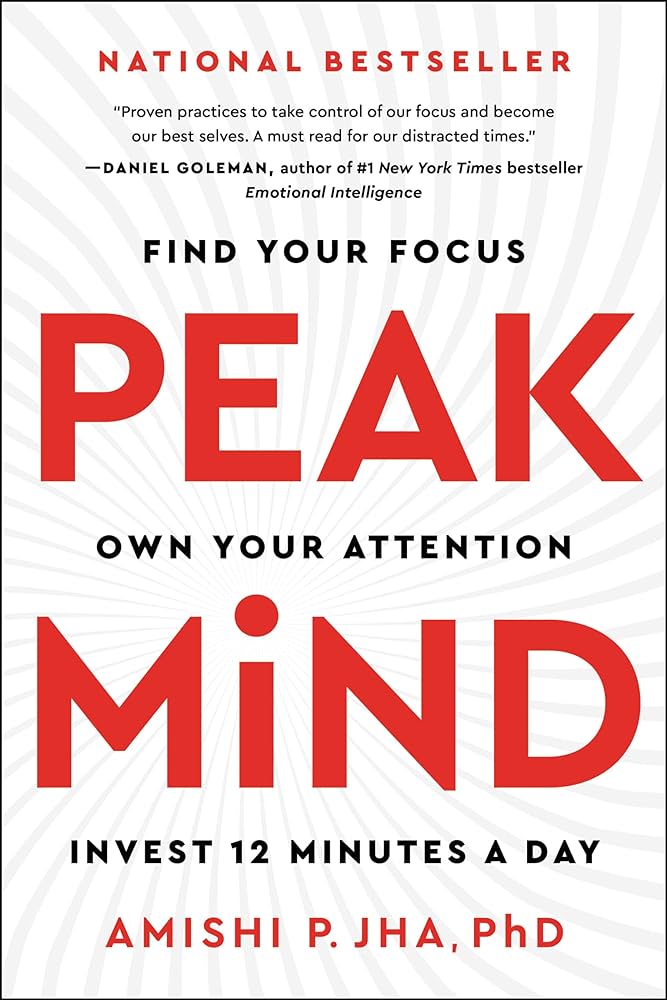In Peak Mind: Find Your Focus, Own Your Attention, Invest 12 Minutes a Day, professor of psychology at the University of Miami Dr. Amishi P. Jha suggests flexible 12-minute-a-day exercises lift the mental fog, declutter the mind and strengthen focus.
You are missing 50 percent of your life. And you’re not alone: everyone is.
Your attention determines: What you perceive, learn, and remember; How steady or how reactive you feel; Which decisions you make and actions you take; How you interact with others; and ultimately, your sense of fulfillment and accomplishment.
Like currency, attention can be paid, given, or stolen; that it is extremely valuable, and also finite.
Our Attention is a superpower
The Extraordinary Impact of Attention
- If you’re feeling that you’re in a cognitive fog: depleted attention.
- If you’re feeling anxious, worried, or overwhelmed by your emotions: hijacked attention.
- If you can’t seem to focus so you can take action or dive into urgent work: fragmented attention.
- If you feel out of step and detached from others: disconnected attention.
Don’t waste your energy trying to get better at fighting the pull on your attention. You cannot win that fight. Instead, cultivate the capacity and skill to position your mind so you don’t have to fight.
Our Ancient Brain
Our brain’s evolution was driven by specific survival pressures, our attention waxes and wanes, making us prone to being distractible. Our distractibility served us well when predators lurked around every corner. However, in today’s technologically saturated, fast-paced, and rapidly shifting world, we’re feeling that distractibility more than ever, and we face new predators that rely on and exploit our distractibility. But no, it’s not something we have to just live with—we can train our brains to pay attention differently. And finally, and most importantly: yes, it is that big of a deal.
Internet Companies and our Attention
Your attention is the product—a commodity that can be sold to the highest bidder. We now have attention merchants and attention markets. All this forecasts a brave new dystopia involving trading in human “attention futures” alongside cattle, oil, and silver. Yet attention is not something that can be banked or borrowed. It cannot be saved to use later. We can only use our attention in the here and now—in this moment.
Powerful Algorithms
So why is it so hard to fix? We’re told to “unplug.” To “break up” with our phones. To work in shorter, more focused bursts. But our brains don’t stand a fighting chance. We can’t outsmart the algorithms designed by an army of software engineers and psychologists. The power of this artificial intelligence lies in its adaptability—constantly learning from us how to best grab our attention, and keep us locked in. It uses the same type of reinforcement that keeps people sitting in front of slot machines in smoky casinos for hours on end, with a dazed look on their faces and a bucket of coins in their laps. But it’s not a slot machine in front of us, it’s an app. And it’s not coins we’re feeding, it’s our attention.
Our brains don’t stand a fighting chance. We can’t outsmart the algorithms designed by an army of software engineers and psychologists.
The Attention System
The attention system performs some of the brain’s most powerful functions. It reconfigures the brain’s information processing in important ways that allow us to survive and thrive in an ever-complicated, information-dense, and rapidly changing world.
Like X-ray vision, your attention zooms through a crowded sea of thousands of people, a cacophony of sounds and flashing lights, to find your friends and your seat at a concert. Attention gives you the ability to slow down time: you can do everything from watching the sun slowly sink over the horizon to meticulously checking your gear before a rock-climbing trip or following a checklist or instruction sheet for an intricate job you’re about to perform—as medical teams do before surgery—and not miss a thing.
The Three Subsystems of Attention: (The Flashlight, Floodlight and Juggler)
The Flashlight
Your attention can be like a flashlight. Where you point it becomes brighter, highlighted, more salient. Whatever’s not in the flashlight’s beam? That information remains suppressed—it stays dampened, dimmed, and blocked out. Attention researchers call this your orienting system, and it’s what you use to select information. You can point that flashlight beam anywhere: outward at your external environment, or inward, to your own thoughts, memories, emotions, body sensations, and the like.
The Floodlight
Where the flashlight is narrow and focused, this subsystem, called the alerting system, is broad and open.
The Juggler
To direct, oversee, and manage what we’re doing, moment to moment, as well as ensure that our actions are aligned with what we’re aiming to do: this is the job of the juggler. This subsystem is what people are referring to when they talk about “executive function,” and the formal name for it is actually the “central executive.
Attention is a currency, a multipurpose resource. We need it for nearly every aspect of our lives, and each form that it takes (the flashlight, the floodlight, the juggler) is relevant for everything we do.
Attention Kryptonites: Stress, Poor mood and Threat
Three major forces degrade our attention: stress, poor mood, and threat. It’s not always possible to pick them apart—they often function in unison, working together to thwack at the attention system.
Stress
That perceived feeling of being overwhelmed that we call stress fuels mental time travel. The tendency of our minds to get pulled by a memory or worry, and to incessantly create stories, takes us away from the here and now as our stress increases.
When you experience too much stress for too long, you get caught in the downward spiral of attention degradation: the worse attention gets, the less you’re able to control it; the less you’re able to control it, the worse stress gets.
Poor Mood
Everything from chronic depression to how you feel after receiving bad news can constitute poor mood. Whatever the source, the effect can be to send you into loops of repetitive negative thought.
Threat
When you’re under threat—or feel that you are—it can be impossible to focus on the task-at-hand or pursue any goal or plan. Under threat, attention is reconfigured in two ways: (1) threat vigilance increases, and (2) attention becomes stimulus-driven, so that anything that is threat-related captures and holds attention.
All the best in your quest to get better. Don’t Settle: Live with Passion.



Comments are closed.